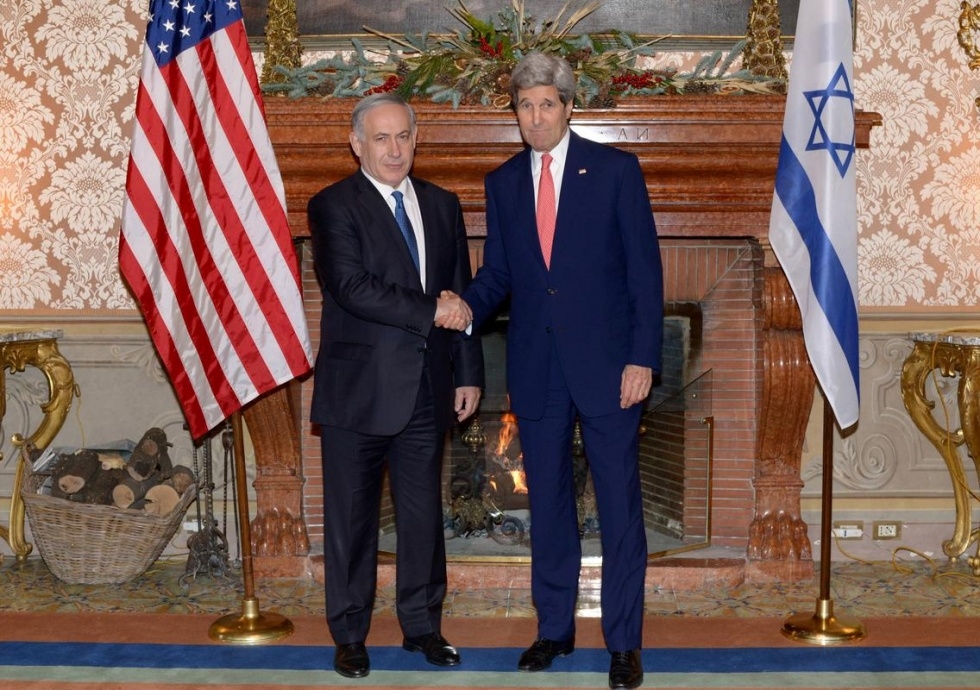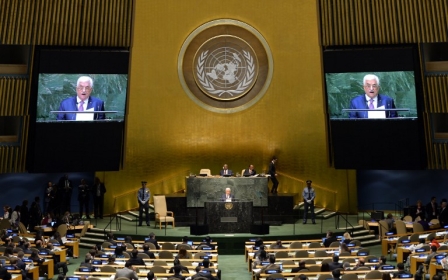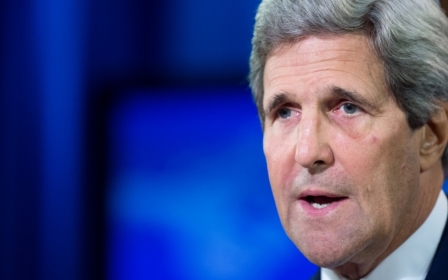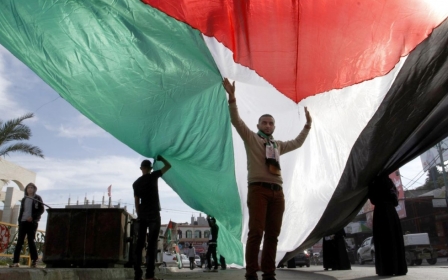Israeli PM says 'will not accept' Palestinian UN bid

Israeli Prime Minister Benjamin Netanyahu Monday angrily rejected a Palestinian bid to set a UN deadline for an end to Israel's occupation amid a flurry of talks led by US top diplomat John Kerry.
"We will not accept attempts to dictate to us unilateral moves on a limited timetable," the Israeli leader said before arriving in Italy.
Amid a renewed drive to push the Israeli-Palestinian peace process to the top of the global agenda, Kerry and Netanyahu met for nearly three hours in the US ambassador's sumptuous residence in Rome.
The Americans are seeking to avert an end-of-year showdown at the United Nations Security Council, which could place them in a diplomatic quandary.
The Palestinians have said they will submit an Arab-backed draft text setting a two-year deadline for an end to the decades-long Israeli occupation of their lands to the UN as early as Wednesday.
Simultaneously France is leading European efforts to cobble together a resolution which could prove more acceptable to the US administration.
The French text would set a two-year timetable, but for concluding a peace treaty without mentioning the withdrawal of Israeli forces.
French connection
Paris is also hoping to seize more of the initiative by not leaving the negotiations solely in the hands of the US.
"The absence of a peace process is fuelling tensions on the ground, so it is imperative to make rapid progress on a UN resolution," said French foreign ministry spokesman Romain Nadal.
"It is vital to relaunch the peace talks as soon as possible and on a credible basis to offer some kind of concrete political horizon to the parties," he told AFP.
US officials have said Kerry is aiming to learn more about the European initiative during his hastily-arranged pre-Christmas trip.
Traditionally the US has used its power of veto at the UN Security Council to shoot down what it sees as moves against its close ally, Israel.
But there is a growing impatience in Europe over the peace impasse amid fears the Middle East risks spiralling into even greater chaos.
Several European parliaments have called on their governments to move ahead with the recognition of a Palestinian state.
US officials told reporters accompanying Kerry that Washington has not yet decided whether to veto or back the French-led UN initiative.
The US administration says it opposes moves to bind negotiators' hands through a UN resolution -- particularly any attempt to set a deadline for the withdrawal of Israeli troops from the Palestinian territories it occupies.
Anger key Arab allies
But a US veto risks running contrary to Washington's avowed aim of a Palestinian state and would anger key Arab allies -- many of whom are much-needed partners in the US-led coalition against Islamic State (IS) militants.
And Netanyahu said that "in the reality in which Islamic terrorism is reaching out to all corners of the globe, we will rebuff any attempt that would put this terrorism inside our home."
"We will stand firm in the face of any diktat," the Israeli leader said ahead of Monday's talks, which included a brief closed-doors meeting with Italian Prime Minister Matteo Renzi.
Kerry also met with the Vatican's Secretary of State Cardinal Pietro Parolin and thanked Pope Francis for "his engagement to try to reduce tensions in the region."
The US secretary of state held late-night dinner talks with the foreign ministers of France, Britain and Germany inside Orly airport in Paris seeking clarification on the French-led resolution bid.
Kerry will then travel to London to meet with the chief Palestinian negotiator Saeb Erakat and the secretary general of the Arab League, Nabil al-Arabi, on Tuesday.
French Foreign Minister Laurent Fabius is also to meet with Arabi on Tuesday.
Diplomatic sources say Paris is hoping to persuade the Palestinians to back their compromise resolution, rather than risk a US veto of the more muscular Arab version.
But the Palestinians are frustrated over the snail's pace of diplomatic efforts.
Jordan says no plan to push for quick UN vote
Meanwhile, Jordan said Monday it had no immediate plans to push for the vote, despite Palestinian statements that the move was imminent.
Jordan's UN Ambassador said she was awaiting the outcome of meetings that Kerry is having with Netanyahu and European governments on the next step at the United Nations.
Jordan, which represents the Arab League at the council, had circulated the Palestinian text setting a deadline of November 2016 for a full Israeli withdrawal.
"Right now, I have no news," Ambassador Dina Kawar told reporters. "Secretary Kerry is having meetings in Europe with a number of ministers so we are waiting to see what happens."
Palestinian official Wassel Abu Yussef told AFP on Sunday following a meeting of the leadership that the draft resolution would come up for a vote on Wednesday.
Kawar said she had learned about the Palestinian decision through the media and had not been approached by the Palestinians to press for action.
Palestinian representative to the United Nations Riyad Mansour said he expected a final version of the draft resolution to be formally submitted to the council..
UN Middle East envoy Robert Serry told the Security Council that a resolution setting out the parameters for an Israeli-Palestinian final settlement could generate "constructive momentum."
But he cautioned that a resolution would be no "substitute for a genuine peace process that will need to be negotiated between both parties."
New MEE newsletter: Jerusalem Dispatch
Sign up to get the latest insights and analysis on Israel-Palestine, alongside Turkey Unpacked and other MEE newsletters
Middle East Eye delivers independent and unrivalled coverage and analysis of the Middle East, North Africa and beyond. To learn more about republishing this content and the associated fees, please fill out this form. More about MEE can be found here.




